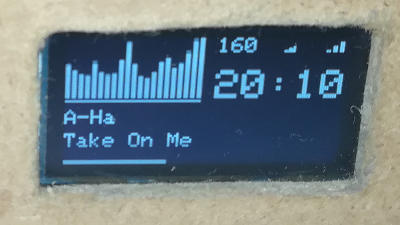Install instructions for RuneAudio
Base system
Install RuneAudio. Ensure a command line prompt is available for entering the commands below (e.g. use SSH, default username 'root', default password 'rune').
Build and install cava
mpd_oled uses Cava, a bar spectrum audio visualizer, to calculate the spectrum
https://github.com/karlstav/cavaThe commands to download, build and install Cava on RuneAudio are as follows
pacman -S autoconf automake clang make libtool fftw alsa-lib
git clone
https://github.com/karlstav/cavacd cava
./autogen.sh
CC=clang ./configure
make
make install
System settings
Configure your system to enable I2C or SPI, depending on how your OLED is connected.
I use a cheap 4 pin I2C SSH1106 display with a Raspberry Pi Zero. It is wired like this. In /boot/config.txt I have the line dtparam=i2c_arm=on. In /etc/modules-load.d/raspberrypi.conf I have the lines i2c-dev and i2c-bcm2708.
The I2C bus speed on your system may be too slow for a reasonable screen refresh. Set a higher bus speed by adding the following line to /boot/config.txt (or try a higher value for a higher screen refresh, I use 800000 with a 25 FPS screen refresh)
dtparam=i2c_arm_baudrate=400000
Then restart the Pi.
If the mpd_oled clock does not display the local time then you may need to set the system time zone. Find your timezone in the list printed by the first command below, and edit the second command to include your timezone
timedatectl list-timezones
timedatectl set-timezone Canada/Eastern
Build and install mpd_oled
Install the packages needed to build the program
pacman -S i2c-tools lm_sensors
Clone the source repository and change to the source directory
git clone
https://github.com/antiprism/mpd_oledcd mpd_oled
The MPD audio output needs to be copied to a named pipe, where Cava can read it and calculate the spectrum. This is configured in /etc/mpd.conf, however, RuneAudio regenerates this file in response to various events and so the RuneAudio code must be changed to insert the section when the file is generated. The following commands install the patch program, copy the FIFO configuration file to /usr/local/etc/mpd_oled_fifo.conf, and patch the RuneAudio code to append this file when generating /etc/mpd.conf. (Note: if, for any reason, regeneration of /etc/mpd.conf has been disabled (for example, if it has been set immutable) then edit the file directly and append the contents of mpd_oled_fifo.conf.)
pacman -S patch
cp mpd_oled_fifo.conf /usr/local/etc/
patch -d/ -p0 -N < runeaudio_mpd_fifo.patch
Reboot the machine from RuneUI, then log back in and change to the mpd_oled source directory, e.g.
cd mpd_oled
If you ever want to make any changes to the FIFO configuration, for example you might want to change buffer_time to help synchronise the spectrum display with the audio on your system, then modify /usr/local/etc/mpd_oled_fifo.conf and restart MPD, by going to the RuneUI MPD Configuration page and clicking on "SAVE AND APPLY" in the volume control section.
Now build mpd_oled
CC=clang CXX=clang++ PLAYER=RUNEAUDIO make
Check the mpd_oled program works correctly by running it while playing music. The OLED type MUST be specified with -o from the following list: 1 - Adafruit SPI 128x64, 3 - Adafruit I2C 128x64, 4 - Seeed I2C 128x64, 6 - SH1106 I2C 128x64.
E.g. the command for a generic I2C SH1106 display (OLED type 6) with a display of 10 bars and a gap of 1 pixel between bars and a framerate of 15Hz is
./mpd_oled -o 6 -b 10 -g 1 -f 15
For I2C OLEDs you may need to specify the I2C address, find this by running, e.g. i2cdetect -y 1 and specify the address with mpd_oled -a, e.g. ./mpd_oled -o6 -a 3d .... If you have a reset pin connected, specify the GPIO number with mpd_oled -r, e.g. ./mpd_oled -o6 -r 24 .... (For, SPI OLEDs, edit display.cc to include your connection details, if this works out I will provide options for these parameters.)
If your display is upside down, you can rotate it 180 degrees with option '-R'.
Once the display is working, edit the file mpd_oled.service to include your OLED type number with the mpd_oled command, and any other options.
nano mpd_oled.service
Then run
bash install.sh
This will copy the program to /usr/local/bin and add a systemd service to run it and start it running. You can start, stop, disable, etc the service with commands like
systemctl start mpd_oled
If you wish to change mpd_oled parameters later then edit mpd_oled.service to include the changes and rerun install.sh.
with the first line pacman -S autoconf automake clang make libtool fftw alsa-lib i already have an error

![]() by adrii » 23 Apr 2018, 16:18
by adrii » 23 Apr 2018, 16:18 
![]() by Devox » 29 May 2018, 17:10
by Devox » 29 May 2018, 17:10 ![]() by LeighP » 24 Jun 2018, 20:31
by LeighP » 24 Jun 2018, 20:31 ![]() by adrii » 18 Jul 2018, 06:41
by adrii » 18 Jul 2018, 06:41 ![]() by Spaker » 20 Oct 2018, 17:22
by Spaker » 20 Oct 2018, 17:22 ![]() by Ripa » 13 Dec 2018, 00:38
by Ripa » 13 Dec 2018, 00:38 ![]() by Ripa » 13 Dec 2018, 02:10
by Ripa » 13 Dec 2018, 02:10 ![]() by hondagx35 » 13 Dec 2018, 17:30
by hondagx35 » 13 Dec 2018, 17:30 ![]() by Ripa » 15 Dec 2018, 00:30
by Ripa » 15 Dec 2018, 00:30 ![]() by Ripa » 15 Dec 2018, 08:19
by Ripa » 15 Dec 2018, 08:19 

